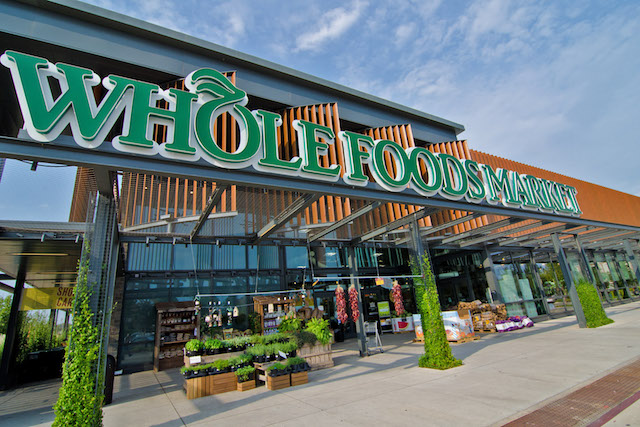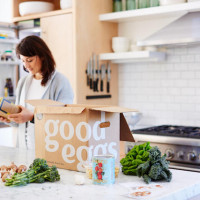
Woah! Amazon is acquiring Whole Foods. Raise your hand if your jaw dropped at the news on Friday and all you could mutter was HOLY SHIT! ✋🏽
To help us make sense of the acquisition, we’re inviting leading entrepreneurs, investors, farmers, chefs and investors to share their take on what Amazon + Whole Foods might mean for the future of grocery and our food system. Below are some of the initial responses we’ve received.
We also published the internal memo Bentley Hall, president of Good Eggs, sent to his team upon hearing the news and Annie’s President John Foraker’s challenge to Jeff Bezos to end food deserts by 2027.
We’ll be publishing reactions from food industry leaders all week. Sign up HERE to get notified.
________________
Benzi Ronen – CEO, Farmigo
Jeff Bezos says that consumers will never say no to cheaper products, more variety and better convenience — and that Amazon will never stop innovating along these consumer preferences. The Whole Foods acquisition is a watershed moment to internalize Bezos’ understanding of the American consumer and what it means for the grocery industry.
Through Farmigo’s data, we see that CSAs that offer more item variety and the ability to select the items they receive each week do better than traditional CSAs. Food hubs that offer home delivery do better than those that use pickup locations. In short, even in the consumer segment that values sustainably grown produce, the consumer leans towards convenience.
Delivery logistics, which includes packing, packaging and routing, make up one third the cost of a home delivered grocery bag. Amazon’s infrastructure, process knowledge and deep pockets give it a winning advantage in providing the consumer with the convenience they desire. Grocery chains have been resistant to any change that eats at their razor thin margins, and as a result, have not made big bets on the future. For example, instead of building state of the art e-commerce stores and investing in home delivery logistics, many like Whole Foods have outsourced this competency to Instacart. They not only have been missing an opportunity to build this expertise in-house, they have been handing their most valuable asset, the customer relationship, over to another company.
We have now reached a tipping point. Any grocery store that does not go all in on advanced technological solutions that drive a better customer experience will find themselves quickly slipping into obsoletion.
Chuck Templeton – Managing Partner, S2G Ventures
I think [the acquisition] is a good thing for online groceries, and for increasing access to better food. It will leave lots of options for companies that want to differentiate, experiment and find ways to satisfy customer needs. People want to find one place to take care of their core needs for the week. Sort of a week solve or meals solved. Not every meal, but being able to address many of our needs in one place.
I think this is good for our portfolio. It will continue to accelerate food delivery, but the the trend of local will also accelerate. This bodes well for our brands. We are excited about the future.
I think the acquisition will accelerate what is already happening over the next 5 years. Local, high quality food, conveniently delivered to your door step, when you want. Those that can provide the best of local foods, meal kits, wine and other spirits, will be the winners. The food system will get more and more local. From national brands to local and regional brands.
Mike Lee – Founder, The Future Market
We just leapfrogged toward the vision of a grocery store that intelligently knows your needs and preferences and can get food to where you are, not where the grocery store is. At this point, I wouldn’t be shocked if Amazon also bought FedEx or UPS and going to the grocery store for food would soon look as antiquated as using a fax machine to send a letter.
Viraj Puri – Co-Founder and CEO, Gotham Greens
Amazon’s acquisition of Whole Foods is incredibly exciting. Two iconic, innovative companies coming together. They’ve both revolutionized commerce in their own ways, so I’m excited to see what the future holds in terms of possibilities from these two giant influencers in commerce.
I believe the acquisition will be good for sustainable food. Whole Foods Market has been a huge influencer to transform American food culture, retailing, personal health and wellness and supply chains. They really have a deep commitment supporting sustainable food. They seek out and value producers and suppliers with their shared set of values. I would imagine that the acquisition allows a much broader audience of Amazon consumers access and exposure to Whole Foods Market; their values and the products they carry.
We are vendors of both Whole Foods Market and Amazon Fresh. While I don’t know what the future holds I would imagine that the acquisition allows a much broader audience of consumers access and exposure to Gotham Greens and our brand of premium-quality, sustainably grown produce.
Andy Levitt – Founder & CEO, The Purple Carrot
Amazon’s acquisition of Whole Foods is a brilliant move by Amazon who sees the significant size of the $650B grocery business, recognizes the potential in disrupting the majority of traditional grocers, and can use some of its cash to make an immediate entry into the category with another highly-respected brand name.
Whole Foods taught us all to embrace high quality produce and grocery items that have been sustainably produced, so I suspect that Amazon will carry that forward, recognizing the important trends that are at play in today’s marketplace. The millennial cohort represents the buying future, and sustainability and transparency are critical factors for them, so I trust that we will see more for sustainable foods than less as a result of this acquisition.
What impact, if any, might this have on your business? I think that Amazon’s move to acquire Whole Foods adds great validation to the model of grocery e-commerce, so that should only help the meal kit category overall. But a consumer is still not going to be able to have Amazon deliver pre-measured ingredients and new recipes each week like meal kit companies do – at least for now. So I think the impact to us will be minimal, if not slightly favorable.
Over the next 5 years, I think large grocers like Kroger and Albertons will be under significant pressure; Costco and Target and other big box players will also be challenged. And certainly Instacart will really be threatened from this move. The food industry will follow the retail category by moving more and more online, with faster growth through that channel than we can even imagine today. And Amazon will be one of the big winners.
Ali Partovi – Angel Investor, Co-Founder, Code.org
The real winner today is Thrive Market. Two huge innovators will be occupied with a complicated integration while Thrive Market seizes the opportunity. The organic market is going mainstream, and Thrive Market is already there, delivering organic food at wholesale prices even in places that Whole Foods doesn’t serve. The deal validates the enormous opportunity: organic sales have grown from less than $10B to almost $50B.
Disclosure: Ali is an investor in Thrive Market.
Debra Eschmeyer – VP of Communications & Community Affairs, DanoneWave
DanoneWave’s unwavering focus is to bring health through food to as many people as possible so we hope Amazon’s acquisition of Whole Foods increases our ability to make healthy food more accessible for all to enjoy.





